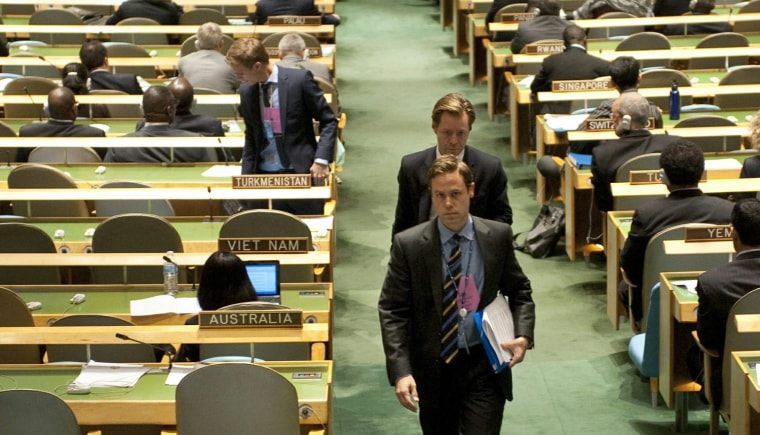The U.S. and several European delegations walked out of the U.N. speech of Iranian President Mahmoud Ahmadinejad on Thursday after he said most people believe the U.S. government was behind the Sept. 11 terror attacks in order to assure Israel's survival.
In his speech to the annual General Assembly, Ahmadinejad said it was mostly U.S. government officials who believed a terrorist group was behind the suicide hijacking attacks that brought down New York's World Trade Center and hit the Pentagon.
Another theory, he said, was "that some segments within the U.S. government orchestrated the attack to reverse the declining American economy, and its grips on the Middle East, in order to save the Zionist regime" — his way of characterizing Israel.
"The majority of the American people as well as most nations and politicians around the world agree with this view," Ahmadinejad told the 192-nation assembly.
The U.S. and some European delegations left shortly after Ahmadinejad made the remarks.
The U.S. delegation issued this statement in response: "Rather than representing the aspirations and goodwill of the Iranian people, Mr. Ahmadinejad has yet again chosen to spout vile conspiracy theories and anti-Semitic slurs that are as abhorrent and delusional as they are predictable."
The Iranian leader also spoke of threats to burn the Quran by U.S. religious groups, calling that an act of "evil." He held up a copy of the Muslim holy book, saying "the truth cannot be burned."
Earlier, President Barack Obama spoke to the session, saying "the United States and the international community seek a resolution to our differences with Iran, and the door remains open to diplomacy should Iran choose to walk through it."
"But the Iranian government must demonstrate a clear and credible commitment, and confirm to the world the peaceful intent of its nuclear program," Obama said.
U.N. Secretary-General Ban Ki-moon, for his part, warned kings, prime ministers and presidents of growing political polarization and social inequalities and implored U.N. members to show greater tolerance and mutual respect to bring the world together.
In his keynote speech, the U.N. chief told leaders from the 192-member nations that "today, we are being tested."
Ban said people everywhere are living in fear of losing their jobs, too many are caught in conflict, "and we see a new politics at work — a politics of polarization."
"We hear the language of hate, false divisions between 'them' and 'us,' those who insist on 'their way' or 'no way,'" he said.
In times of such polarization and uncertainty, Ban said, "let us remember, the world still looks to the United Nations for moral and political leadership."
The meeting follows a three-day summit to promote the achievement of U.N. anti-poverty goals by 2015 that wrapped up late Wednesday night. Many leaders who attended that summit remained in New York for the ministerial session, and will shift gears to other world issues from the continuing impact of the global financial crisis to terrorism and nuclear proliferation.
Ban urged Iran "to engage constructively with the international community and comply fully with Security Council resolutions" calling for Tehran to suspend uranium enrichment and return to talks.
The secretary-general also touched on many other global issues — urging North Korea to return to six-party talks on its nuclear program, calling on Israel and the Palestinians not to take any action that would hold back progress on peace talks, urging progress on nuclear disarmament where "we see new momentum," and declaring again the climate change remains the world's "defining challenge."
Just ahead of Obama's speech, Brazilian Foreign Minister Celso Amorin sharply criticized the United States, saying that the 2003 invasion of Iraq demonstrated that the "blind faith in intelligence reports tailored to justify political goals must be rejected."
"We must ban once and for all the use of force inconsistent with international law," Amorin told the General Assembly, adding that all international disputes should be peacefully resolved through dialogue.
The Bush administration did not seek authorization from the U.N. Security Council for the invasion, which would have legitimized the action under international law.
On Wednesday, European Union foreign policy chief Catherine Ashton, Secretary of State Hillary Rodham Clinton and the foreign ministers of Britain, China, France, Germany and Russia met to try to find a solution to the long-running dispute over Iran's nuclear ambitions. They urged Iran to come to the table for a new round of talks, and said it remained essential for Iran to prove its nuclear program is peaceful.
The U.S. and key Western allies fear Iran could try to process its low enriched uranium into highly enriched uranium to make an atomic weapon. Iran insists its nuclear program is purely peaceful, aimed solely at producing nuclear energy.
